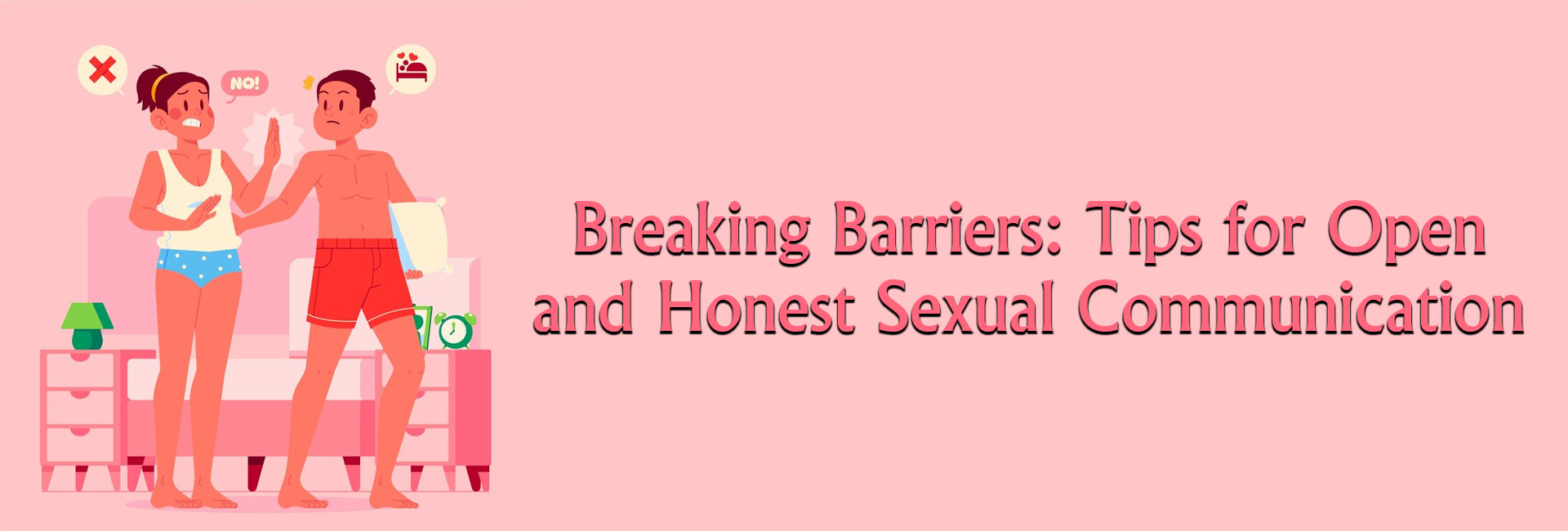Breaking Barriers: Tips for Open and Honest Sexual Communication
Maintaining healthy relationships requires more than just love and affection. Honest communication in relationships plays a crucial role, especially when it comes to intimate matters. Many couples struggle with overcoming sexual communication barriers, leading to misunderstandings and unfulfilled desires. This blog post aims to provide valuable sexual communication advice and relationship talk tips to help you foster a more open and satisfying connection with your partner. By the end, you will have practical strategies for initiating and maintaining open relationship communication, ultimately strengthening your bond and enhancing your intimate life.
Importance of Honest Communication in Relationships
Honest communication serves as the foundation for any strong relationship, particularly when it comes to intimate matters. It allows partners to express their desires, boundaries, and concerns openly, fostering trust and understanding. When couples prioritize transparent dialogue about their sexual needs and preferences, they create a safe space for vulnerability and growth. This openness not only enhances physical intimacy but also strengthens emotional connections. By embracing honest communication, couples can navigate challenges more effectively, leading to increased satisfaction and a deeper sense of partnership in all aspects of their relationship.
Common Barriers to Sexual Communication
Overcoming sexual communication barriers is essential for a healthy and fulfilling relationship. Many couples face obstacles when discussing intimate matters, such as fear of judgment, embarrassment, or past negative experiences. Cultural taboos and societal expectations can also hinder open conversations about sex. Some individuals may worry about hurting their partner's feelings or fear rejection if they express their true desires. Additionally, a lack of vocabulary or comfort with sexual topics can make it challenging to articulate needs and preferences. Recognizing these barriers is the first step towards breaking them down and fostering a more open dialogue about intimacy.
Creating a Safe Space for Open Relationship Communication
Establishing a safe and non-judgmental environment is crucial for fostering open relationship communication, especially regarding intimate matters. Start by choosing a comfortable, private setting where both partners feel at ease. Agree on ground rules, such as active listening without interruption and refraining from criticism. Encourage empathy and understanding, reminding each other that vulnerability is a strength. Use "I" statements to express feelings and needs without blaming. Practice active listening by paraphrasing what your partner says to ensure understanding. By creating this safe space, you'll build trust and make it easier to discuss sensitive topics, leading to more honest and productive conversations about your sexual relationship.
Timing and Approach: When and How to Initiate Sexual Conversations
Choosing the right moment and approach for sexual communication advice can significantly impact its effectiveness. Avoid initiating these conversations during or immediately after intimacy, as emotions may be heightened. Instead, pick a neutral time when both partners are relaxed and free from distractions. Start with lighter topics and gradually progress to more sensitive subjects. Use open-ended questions to encourage dialogue and show genuine interest in your partner's perspective. Be mindful of your tone and body language, ensuring they convey openness and respect. If tensions arise, take a break and revisit the conversation later. Remember, effective communication is an ongoing process, not a one-time event.
Active Listening: The Key to Understanding Your Partner's Needs
Active listening is a crucial skill in overcoming sexual communication barriers and fostering deeper understanding between partners. When discussing intimate matters, give your full attention to your partner, maintaining eye contact and providing non-verbal cues that show you're engaged. Resist the urge to formulate responses while they're speaking; instead, focus on truly comprehending their message. Paraphrase what you've heard to ensure accuracy and ask clarifying questions when needed. Acknowledge your partner's feelings and validate their experiences, even if you don't agree entirely. By practicing active listening, you create a supportive environment that encourages honest communication in relationships and helps both partners feel heard and valued.
Expressing Your Own Desires and Boundaries
When it comes to sexual communication advice, expressing your own desires and boundaries is just as important as understanding your partner's. Start by reflecting on your needs, preferences, and limits. Practice self-awareness to identify what truly matters to you in your intimate life. When sharing these thoughts with your partner, be clear and specific, using "I" statements to convey your feelings without placing blame. For example, say, "I feel most comfortable when..." instead of "You always..." or "You never..." Be open to questions and provide explanations if needed. Remember that it's okay to have boundaries and that communicating them clearly contributes to a healthier, more satisfying relationship for both partners.
Navigating Differences and Finding Compromise
In any relationship, differences in sexual preferences or desires are bound to arise. The key to overcoming these sexual communication barriers lies in approaching these differences with openness, respect, and a willingness to compromise. Start by acknowledging that it's normal and okay to have varying interests. Avoid dismissing or judging your partner's desires, even if they don't align with yours. Instead, focus on finding common ground and areas where you can meet each other halfway. Explore new experiences together, setting clear boundaries and establishing a safe word if needed. Remember that compromise doesn't mean sacrificing your comfort; it's about finding mutually satisfying solutions that respect both partners' needs and boundaries.
Seeking Professional Help: When and Why
Sometimes, despite best efforts, couples may find themselves struggling with honest communication in relationships, particularly regarding intimate matters. In such cases, seeking professional help can be a valuable step. Consider couples therapy or sex therapy if you consistently face difficulties in discussing sexual topics, experience persistent misunderstandings, or feel stuck in patterns that hinder intimacy. A trained therapist can provide unbiased guidance, teach effective communication techniques, and help you work through underlying issues. Remember, seeking help is a sign of strength and commitment to your relationship, not weakness. Professional support can equip you with the tools and insights needed to foster open relationship communication and enhance your overall connection.
Final Thought: -
Honest communication in relationships is an ongoing journey, not a destination. By consistently applying the sexual communication advice and relationship talk tips discussed in this blog, you can create a more open, satisfying, and intimate connection with your partner. Remember that overcoming sexual communication barriers takes time, patience, and practice. Embrace vulnerability, practice active listening, and approach differences with empathy and a willingness to compromise. Whether you are navigating new desires, addressing concerns, or simply checking in with each other, maintaining open relationship communication about your intimate life will strengthen your bond and lead to a more fulfilling partnership. Keep the conversation going, and watch your relationship thrive both in and out of the bedroom.



